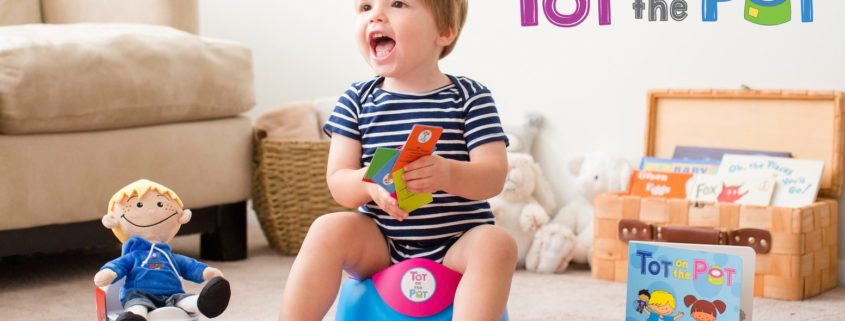Potty Training – How to teach your toddler to use the toilet
Potty training (or rather: Toddler Learning to use the Toilet)
Article written by Ofra Sharp. http://www.toddlerworkshop.co.za/
Children learn to use the toilet when they are ready, not when their parents are ready!
Introduction:
When a child is born the brain and the nervous system development are incomplete, from birth the nervous system goes through a process of being coated with Myelin which facilitates a more efficient impulses transmission in the nervous system. This allows the baby to gain motor control and movement co- ordination.
Between the ages of 18 months to 3 years old the nervous system becomes better developed and more integrated, which helps the child to gain more awareness and control over some involuntary muscles which are responsible to bladder and bowel movement. Research in child development shows that the average child does not achieve reliable daytime control until age two and half to three years of age. It also showed that boys on the whole start later then girls and that early start of training is not a guarantee of early success- but rather the opposite.
I hope that this brief explanation will help you understand the reason of why you can not rush your child or expect your little one to do something that he/she physically (and often emotionally) is not able to do yet! Your child WILL start using the toilet sooner or later, you will only delay the process, add to their anxiety, frustration and low sense of Self if you become ‘pushy’ before he/she is ready! I can’t stress enough how important it is to be patient, you can not hurry the process. I have seen many children who ‘got toilet training’ too early and regress till age 4years or older (often needing therapy) before willing to sit on the toilet again! Often those kids ‘keep it in’ fearing failure resulting in bladder infection, constipation and anxiety issues. Many second time mothers will witness to that; I often hear of pressures from friends, relative etc. leading to mum trying to hurry the process of ‘Potty Training’ resulting in struggles, anger, fears and the inevitable failures of a bewildered child.
Getting Ready: Between the age of 18- 24 months
- Let your child come with you to the toilet. Teach your toddler the words you use in your family for urinating and for bowl movement. (E.G. Wee/ Poo). This will help him/her later on when they have a need to tell you. (I use Wee and Poo in this article)
- Let your child ‘help you’/ teaching him/her: cut the toilet paper for you, flash the toilet and wash hands. You can get a potty, offer your child to sit on potty while you are on the toilet. It is a good idea to let Boys learn from Dad what to do when making a wee.
- When you change your toddler’s nappy say “you made a……” if possible throw the poo in the toilet and let child flush it then wash hands together. Explain bodily function (Every one makes a poo it is a bit smelly etc). Keep ‘toilet talk’ positive.
- Notice when your child is able to pull down his/her own pants. It may be a good time to introduce “pulley nappy”. When needing a change suggest that he /she helps you to pull them down- this will prepare the child for when he /she is ready to sit on toilet.
- Often the facial expression tells you that your child is busy making a poo; some do it at the same time of the day; Casually suggest sitting on the potty WITH the nappy while he/she is busy- give a book if you think it will help. Often children prefer to be alone- leave them, this is also a sign that they becoming aware of the bowl movement however not ready to do it in the toilet.
When the child shows Readiness:
- The child shows discomfort when the nappy is wet or soiled and will ask to be changed.
- Your child is able to follow simple instructions.
- Often the child wants to imitate an older siblings/ or friend at school and asks to sit on the toilet. Allow it at every nappy change and before bath time- even if he/she doesn’t do anything in the potty.
- The child tells you “I am making….” Offer him/her to do it in the bathroom. Let the child sit with the nappy on while busy making a poo. Together throw the poo in the toilet and let the child flush- this creates the association of ‘where the poo goes to.’
- It is important that the child is stable when sitting- Make sure that the child’s feet are always supported- on floor or on stool.
- Warmer weather is easier time for training- you can put cotton pants or even let your child walk with out anything while at home (This is only if your home environment is supportive of this)
- Keep taking your child to the toilet- even if he/she doesn’t have the need. Encourage them to sit, and try. Keep the time on potty short and ‘cheerful’ never longer then 5min.
- Have a star chart on the bathroom’s wall, each time the child is successful praise him/her but DO NOT go over board- this can set expectation in the child’s mind with fear of failure… rather say ”Well done you made a… lets clean up and you can get a star for you chart!”
- Reward your child (I start with little reward after 5 stars, after few months move to 10 etc.)
- Inform whoever cares for your child when you start training him/her- nanny, school etc.
- DO NOT expect your child to go out with underpants- let him/her use nappy until mostly he/she is able to tell when they need to go.
- Remember that often children want the nappy on when making poo- it could be because constipation, anxiety (feeling as if part of the body falling out) and embarrassment. Don’t get upset Respect your child’s need- soon he/she will be able to let go of the nappy.
- Remember that accidents will occur! DO NOT fuss about it, do not punish the child, simply say “its ok, it happens, lets clean you up” Even a 5yrs old child who gets involved in a game may not notice the need to make a wee and have an accident.
- Suggest to your child a trip together to the shop- let him/her choose his/her own new underpants.
Sum up of what works: Praise, encouragement, Patience and some more! Making the process a positive fun learning experience. Giving the child a sense of pride. Consistency- make sure all care giver use the same approach and routine. Remember your child is an individual who has his/her unique needs. Respect your child’s need for independence but set boundaries. (E.G. no wee on the road…) Set an example!!!
Sum up of what does not work: Starting before the child is ready. Getting anxious and letting others pressurize you to rush your child. Being shy about toilet talk (with your child!). Making threats and punishing. Anger impatience and worry. Creating negative association around normal bodily functions (E.G. “Poof this is stinky dirty…”). Remember boys and girls are different. Too much fuss and talk about it.
I always like to remind parents of average children that by the time your child gets married:
- Your child will be able to walk!
- Your child will be able to talk!
- Your child will not suck dummy!
- Your child will be able to use the toilet!
Ofra Sharp
Time2getherPinelands






